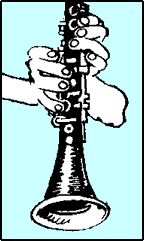
|
Have you ever stopped to consider how much of the time you spend playing your instrument is spent alone in the practice room? Unless you're a veteran performer who's a seasoned master of technique with a large repertoire, you probably spend a large percentage of your playing time "practicing". The best players are usually those who use this time most effectively.
Take a few minutes to review some fundamentals: the WHO, WHAT, WHEN, WHERE, HOW & WHY of practice.
It's never too early to consider these questions ... good habits formed early will make for more productive use of your practice time for the entire course of your playing career. And it's never too late to take a good look at your practice routine and habits to see how you can improve in these areas ... you just may be able to make your practice time more efficient, productive and pleasurable!
|
|
WHO?
You will be what you make of yourself!
|
WHO?
You, yourself, of course.
To do well, you must learn how to teach yourself as well as how to learn from others. When you take a lesson, either privately or in a class, you will listen to others who will guide you. But when you practice, you must be your own teacher!
You must give careful attention to both these roles -- serving as your own teacher as well as being the student -- as one depends upon the other. To succeed in being your own best teacher, you need to first listen carefully to others. To learn best, you must understand your goals clearly. Only then can you effectively teach yourself between lessons.
- Long hours of practice with no guidance (from a teacher during lessons and from yourself during practice) will end in failure.
- Good teaching followed by aimless, thoughtless practice will end in failure. (And, needless to say, good teaching followed by NO practice will yield even worse results!)
- But good instruction followed by thoughtful, intelligent self guidance is the key to success.
In the end, you will be what you make of yourself. |
|
WHAT?
Practice the solution .. not the problem!
|
What you practice depends, of course, on your immediate goals and the demands you are encountering at the present. In general, however, you'll want to vary your practice routines to keep them vital. Approach the same problem from various angles through different exercises. At first your teacher can give you some ideas along this line, and later you can be creative in making up your own exercises.
But don't make the mistake of repeating passages over and over, continuing to make the same mistakes. You're only furthering the problem by practicing the mistake! |
|
WHEN?
Practice when you're fresh ... quit when you get tired.
|
If at all possible, choose a practice time when you are well rested and your enthusiasm is high. Tired practice may be better than no practice, but there is no substitute for a clear mind and an energetic body!
A pleasant atmosphere, undisturbed by noise and interruptions, is most conducive to concentration on your practice objectives.
And learn to quit when your mind and your muscles become tired. Overworking muscles results in "helping" out those tired muscles in the wrong way. Under these circumstances you are only practicing yourself into bad playing habits! |
|
WHERE?
Find a quiet place with good acoustics, good air, good light and a good chair.
|
Try to find a comfortable, quiet place to practice. This is not always easy -- especially in a family setting or in college practice facilities!
If you have a choice of practice rooms, remember that room acoustics are important. In general the larger the room, the better. However, rooms with thick carpeting and upholstered furniture will absorb a great deal of sound and make your sound feel dead. On the other hand, a large kitchen with a hard floor will have too much reverberation and cause confusion to the ear. A carpeted bedroom would probably not be particularly good, and an echoey bathroom would be the worst! Perhaps a dining room would be best -- or a den or family room that could be closed off from outside noise.
Good air circulation and good lighting are also very important. A good music stand and comfortable chair that allows you to sit erect are musts. (Some teachers may recommend that you stand while practicing.)
Find the location that works best from those you have available, and try to practice there regularly. Constantly changing your practice room can lead to confusion in various aspects of your self evaluation. |
|
WHY?
Set your goals ... always be conscious of working to reach them.
|
Why practice? To get better, of course!
But to make optimum progress it's important to maintain a clear overview of your goals, long term as well as short term. You should have in mind the reason for all the steps you take in your daily practice. Know and continue to be aware of why you're practicing those long tones and learning those scale finger patterns.
In the end, music is for the ear. You want to sound better. So, above all, remember to listen. And make your judgements and adjustments based on what you hear.
|
|

